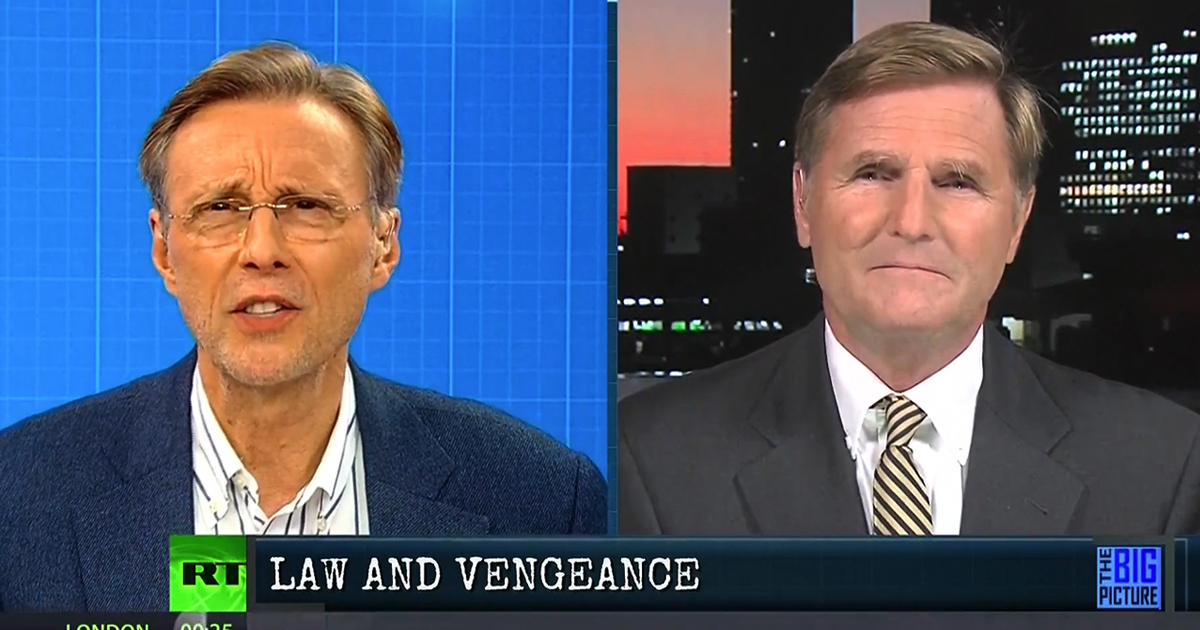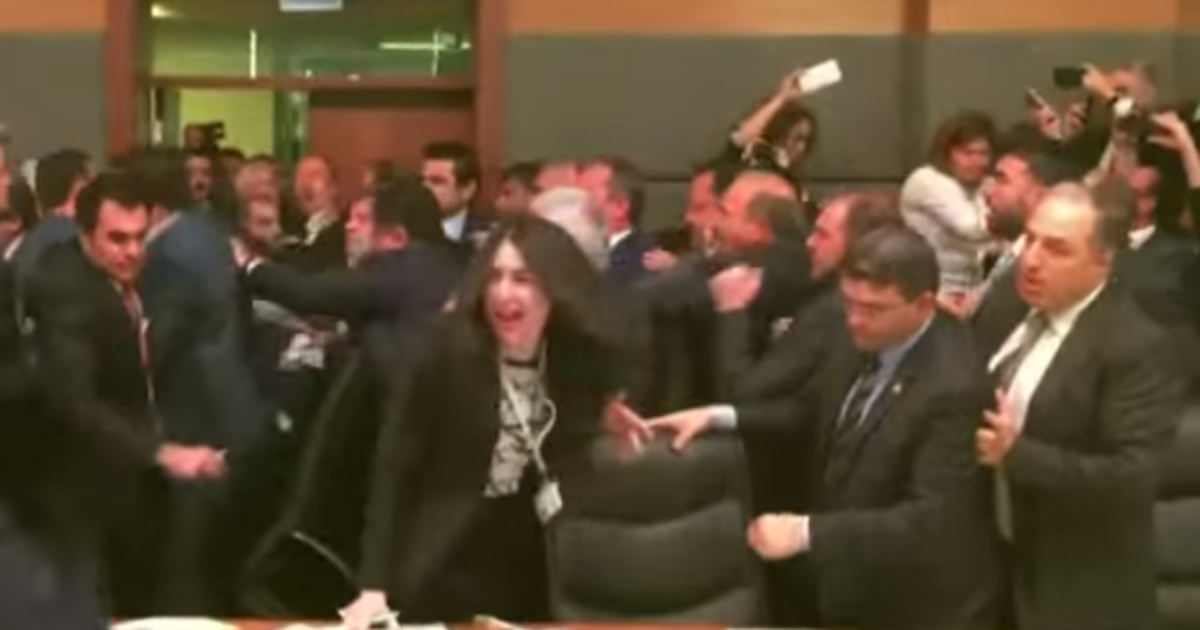Via The Big Picture RT: Mike Papantonio, Host-America’s Lawyer (RT America) / Host-Ring of Fire Radio / Author-Law and Disorder & the brand new sequel, Law & Vengeance. What a legal thriller can tell us about fighting back on the military Industrial complex.
To order your copy of “Law and Vengeance,” click here: LawAndVengeance.com
Transcript of the above video:
Thom Hartmann: What happens when one person takes on one of the most powerful and dangerous industries in the country? That’s the subject of the new legal thriller by RT America and Ring of Fire Radio host Mike Papantonio. The book is called, Law and Vengeance. It’s coming out at the end of this month. It’s available for pre-order right now. Joining us now to talk more about his book is Mike Papantonio himself. Pap, welcome back.
Mike Papantonio: Tom, good to see you.
Thom Hartmann: It’s great to have you with us. First up, Pap, I understand this book is based somewhat on a true story. Can you tell us about that?
Mike Papantonio: Yeah, it’s a case this law firm actually handled, where we had a weapons manufacturer, obviously, somebody who contracts with the government on a regular basis. It made a product that was a gun sight and, unfortunately, the gun sight didn’t work. For about every 100 yards, it was off several degrees. It ended up causing injury and actually people being killed by it. When you put it out in humidity, you put it out in hot air and humidity, it just malfunctioned.
Here’s the real problem: The government knew about it. The government understood that there were problems with it, they sold it anyway, they put it on the market anyway. Then on top of that, when the government found out about it and actually realized that the company had actually committed fraud, nobody’s been to jail on this thing. It’s a typical kind of thing we see with the whistleblower case, Tom. We have these whistleblowers that put everything on the line to share what happened, to tell about corporate misconduct, to try to get the government to try to get some of this money back. You remember when $12 billion showed up in Iraq. We still don’t know to this day where that money went, and the whistleblowers that tried to make it an issue, we heard nothing else from them, either.
What ends up happening is, this is a case that, the book surrounds the issues of the whistleblower, what a whistleblower goes through, and what the government does, how dysfunctional the Department of Justice has become to where it’s really just about finding these people, slap them on the wrist. They make a product that ends up killing a soldier or police officer, you know, that’s okay. You continue doing business with us anyway.
Most of these weapons manufacturers that get caught, within a year, are doing business with the government again. It is the biggest scam and, if taxpayers understood the number, the billions and billions of dollars that we squander away to thieves that steal from the government, steal from taxpayers, make products that don’t work, taxpayers pay for it. This book is a fiction, although it’s a real case that we handled, it surrounds what actually happens to that whistleblower in the process.
Thom Hartmann: What inspired you to write the character of Gina, the main character in Law and Vengeance?
Mike Papantonio: I think women have had a very tough time moving into the practice of law. I’m embarrassed by it, frankly. They move into the practice of law, but they’ve been held down where it comes to their ability to show up in a courtroom and be a trial lawyer because, A, they haven’t been well-mentored in that and they haven’t been given a lot of opportunity where it comes to doing that type of thing. Gina Romano was a composite character. She’s the protagonist in this case, one of them. She’s a composite of some of the best female trial lawyers that I’ve worked against and worked with over the years, very, very tough character. Some of the best female trial lawyers are, they’re very talented, they’re tenacious, you just don’t want to be on their wrong side at the wrong time.
Gina Romano is all of that, and she takes on the Department of Justice, she takes on one of the biggest weapons manufacturers in the world, she takes on police unions. In the end, she does it with a kind of class and kind of training that a good trial lawyer should be able to do. She’s a great character. She’s going to resurface in a couple of other books that I’m working on right now.
Thom Hartmann: That’s great, because it is a page-turner. This books centers around the issue of faulty gun sights, you mentioned that earlier, that were sold to our government. How concerned should we be about something like that in real life, or is that just meta to this larger issue of corporations putting their stockholders and their senior executives’ compensation above all else?
Mike Papantonio: We should be very concerned. Take this same scenario and put it with a drug company, for example, that manufactures a drug that they know is defective. They put it on the market because they know once it gets on the market, the FDA is so dysfunctional, such a disaster, that the product is going to stay on the market for years, kill and cripple people in the process. They’re going to make billions of dollars, so the consumer, again, is at risk. The company, simply, when they’re blind with the money that they’re making, they don’t really care a lot about the consumer.
Again, what does the Department of Justice do about that? When a whistleblower comes forward and the whistleblower says, “You know, there’s a product out there I worked on, I know about the problem, I can tell you, I can show you the documents that say that this is a problem,” sometimes, we have a Department of Justice, actually, it’s become the norm for the Department of Justice, to let these companies get away with it.
They don’t look like criminals because they don’t wear hoodies, they wear Armani suits. They don’t look like criminals, so we let them go. We fine them. We fine them a billion dollars. Well, they make a billion dollars, most of these products, they make anywhere from $6 billion to $7 billion a year, so a billion-dollar-fine means nothing to these companies. The only thing that does is putting them in jail. Once a whistleblower comes forward and shows, completely shows the story to the government, here are the documents, here’s what I said, here’s what they said, here it all is, and get the Department of Justice for once, just for once, to do their job and throw some of these thugs in prison, and you’ll see the culture within these corporations change.
Until the Department of Justice does it, unfortunately with Sessions, we have zero chance that that’s going to happen. Under Holder, the Obama Administration was a miserable failure. Nobody went to jail when they stole from taxpayers. That’s going to continue. Until we stop that trend, we’re going to put up with it year after year.
Thom Hartmann: Yeah, what a surprise. If you don’t police, then the criminals just keep doing more and more of what they’ve been doing. Can you talk about the role To Kill a Mockingbird, the movie, play, book, plays in this book? Why was that such a personally important theme for you?
Mike Papantonio: It had a big influence on me deciding to practice law. I wrote a book, In Search of Atticus Finch, when I was a young lawyer. That book was about how we should live as lawyers, that we don’t separate the way we live as a parent or a spouse, we live our life in a continuum. Hopefully, that continuum is something that is beneficial to our family, to the people that we serve. I really believe the character, Nick Deketomis is one of the protagonists in this book. He was also the main character in the first book, Law and Disorder. I think he embraces a lot of these characteristics that Atticus Finch showed in To Kill a Mockingbird. It gives us a goal as a lawyer. We can say that we can live through this time when we’re criticized as being no damn good, or we can show by leadership and show that we do, that the legacy that we leave behind should be valued.
You’ll see it in all of my books, there will be some iteration of Scout or To Kill a Mockingbird will show up in all the books. I’m doing four of these books. This is the second in a series of four, and the next one has to do with the opioid crisis in the United States. It’s called, Law and Addiction. The fourth one is called, Law and Terror. It’s about banks, international banks washing money for international terrorists. You may recall, they pled guilty, nine banks pled guilty to that a couple of years ago.
Thom Hartmann: Yeah, I recall.
Mike Papantonio: Those are all cases we’re handling, by the way.
Thom Hartmann: Remarkable. You say in this novel that there are two kinds of lawyers. Can you tell us what those two kinds are and their significance?
Mike Papantonio: I think the two kinds of lawyers go into with the thought that you can do well by doing good. There’s another type of lawyer that is kind of the businessman, that all they really care about, how many cases do I have, how big am I, do they know my name, how many billboards do I have up, how many commercials did I do on last night’s television? It’s all about business and, in that business, you lose the thread of what we should be doing as lawyers, how we should be serving the community, about how when we do our job, when we take on these almost impossible cases.
I think all the way back to tobacco, when we were so criticized, our law firm was so criticized by trying to take on tobacco, impossible, how dare you do that. We knew it was an uphill battle, but we also understood that, in that, might come some good. Our effort to do good actually ended up working very well for us financially, but it also worked well for us, I think, in sustaining an important legacy for this law firm for many years to come.
I think those are the two different kinds of lawyers. One’s all about business. The other one kind of remembers why they went to law school to begin with.
Thom Hartmann: Right, one has a vocation, the other has an avocation, as well. What do you want readers of this book to learn about the culture of law in this country, especially when it comes to the weapons industry?
Mike Papantonio: I think one thing I want people to learn is, I want people to understand that they’ve been sold a terrible bill of goods by the U.S. Chamber of Commerce, suggesting that all lawyers are simply bad, that everybody who brings a lawsuit in the United States has some ulterior motive and they must have some awful thing in their mind when they bring a lawsuit. I want people to understand that there are many lawyers in this country that change our culture, that we make huge leaps forward as a culture because of what they do. It may be civil rights, it might be environment, it might be going after corporate thugs, like this firm does [inaudible 00:10:33].
There’s a whole collection of things that actually changes this culture in a positive way. On the other side of it, you have the bottom feeders, just like you have in any profession, whether it’s journalism, doctoring, you name it, at Wall Street, you’ve always got the bottom feeders. Nothing is going to change about that. The only problem is, most Americans have bought into this U.S. Chamber of Commerce lie that all lawyers are bad. Interestingly enough, if you ask individuals, what about your lawyer? You personalize it, what about the lawyer that helped you on this divorce or this criminal issue? They’re going to tell you they like them because, most of the time, most lawyers are there to serve. Unfortunately, it’s only that few that have taken this to a business, where it’s not about serving anymore, it’s about how much money can I make?
Thom Hartmann: It’s a real tragedy. By the way, it’s not just infecting the legal profession. It’s certainly infected our politics. Mike
Papantonio, a brilliant book. I highly recommend it. Thanks so much for being with us tonight.




